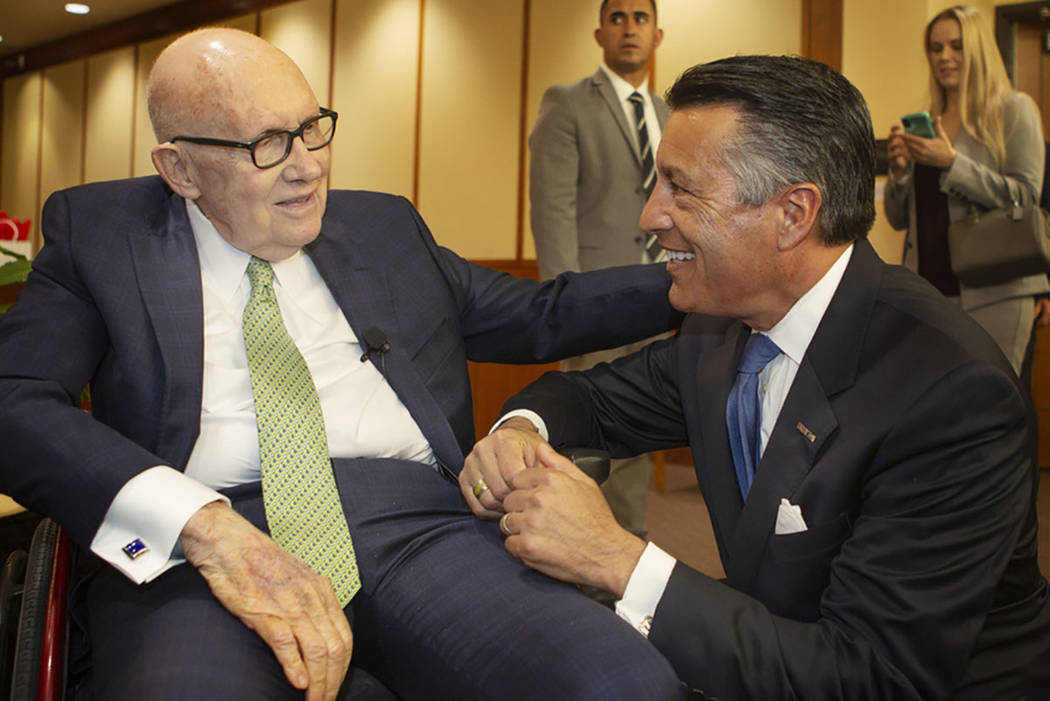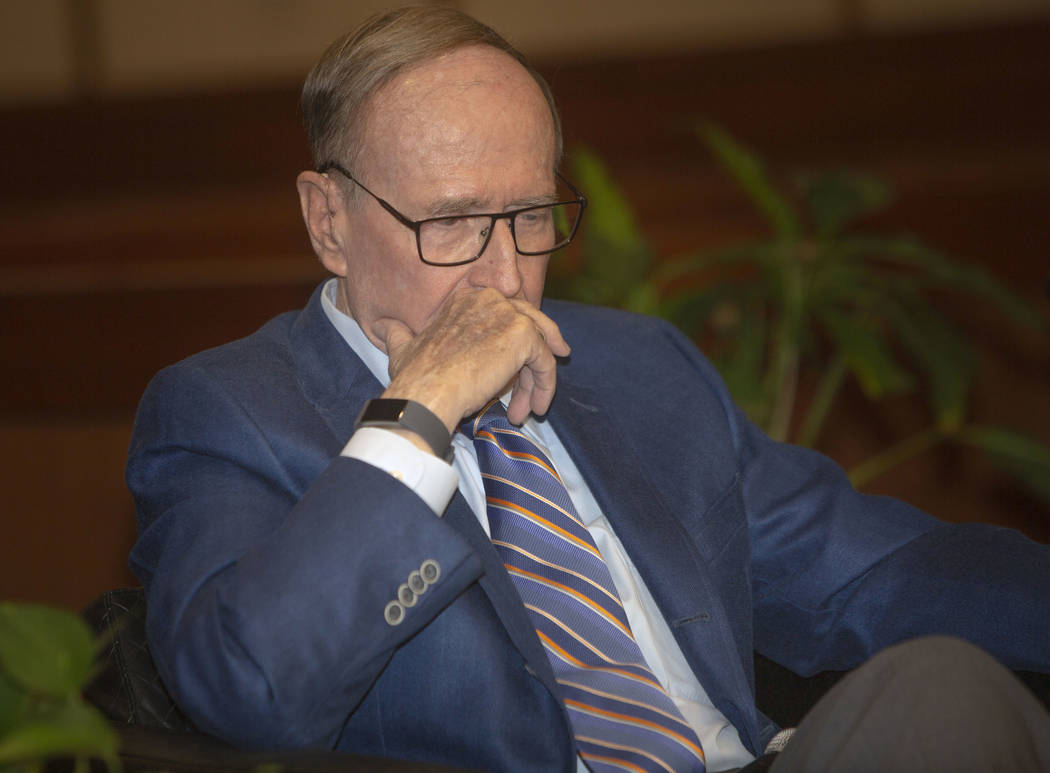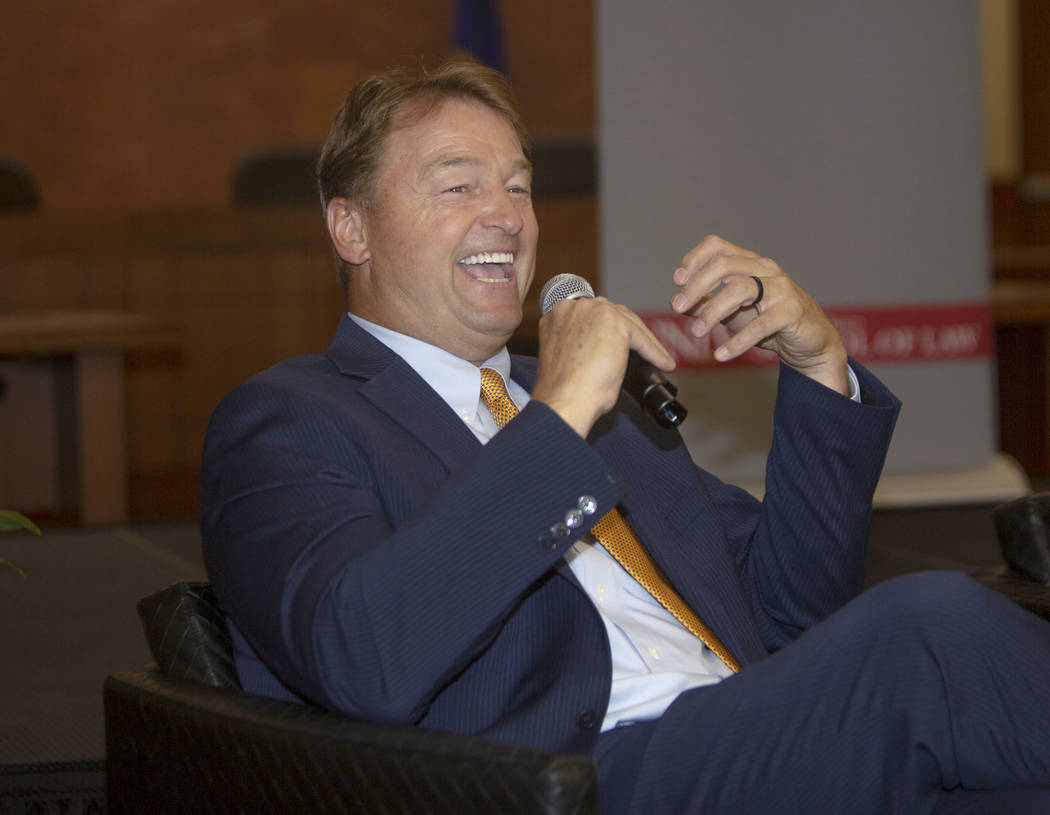Steve Sebelius: Leadership lessons from people who’ve been there
In politics, the bitter battles fade over time, not entirely painless in retrospect but certainly less acute in intensity.
It was something to keep in mind last week as some of Nevada’s most prominent political warriors gathered to tell stories and share insights on the topic of leadership.
At the remove of history, old rivalries had faded. Richard Bryan, a former assemblyman, state senator, attorney general, governor and U.S. senator, shared the stage with Robert List, a former district attorney, attorney general and governor. The men are friends now despite nearly perfect political records; the only race either man ever lost was to the other.
Brian Sandoval, the former assemblyman, Gaming Control Board chairman, attorney general, U.S. District Court judge and governor — who convened the meeting as part of the UNLV William S. Boyd law school’s law and leadership program that he’s heading — allowed that his resume did not include federal office.
That prompted Harry Reid, former assemblyman, lieutenant governor, congressman and U.S. senator, to say he was glad; had Sandoval run against Reid for Senate, Reid admitted, Sandoval would have won. (In fact, Reid helped engineer Sandoval’s appointment to the federal bench to avoid a Senate fight.)
There was even some gentle joshing. When Dean Heller, former assemblyman, secretary of state, congressman and U.S. senator, said he would never have been elected to the Senate without his wife, Reid broke up the crowd by retorting, “Boy, we know that.”
But the mellowness that comes after leaving the political arena doesn’t erase the value of lessons about leadership earned in the crucible of it, or the mutual respect shared only by those who have known it personally.
The goal of the law and leadership program is to prepare future Boyd law students for public service, if that’s the path they choose. (Although perhaps the first lesson was taught by former Wyoming Gov. David Freudenthal, who reminded the audience that leadership doesn’t necessarily mean an elected title.)
“Don’t build your life around politics, because politics has a serendipity to it that you can’t control,” he said.
Reid, whose reputation for ruthlessness and cunning survives despite his 2016 retirement, advised students to be nice to everybody, regardless of how they feel about you. For a man whose haters are legion, the remark showed Reid — now fighting pancreatic cancer — can still surprise.
Heller said leadership was much more about listening to people than talking to them, advice that was echoed by other speakers at the event. Sandoval, in particular, insisted on hearing diverse perspectives from every side before making a decision.
Bryan encouraged students to be honest with everyone and to figure out where you want to go first. A leader has to know the way before he or she can convince anyone to follow, he said.
He also stressed the importance of having people who aren’t afraid to suggest another course of action. Having contrarians in your circle is a better way to avoid error than “yes” men. Bryan said there were many things he never did in his public life because he got good, albeit contrary, advice.
Reid said it was important to have good relationships across the aisle, such as the ones he maintained with Heller and former Republican Sen. John Ensign. “There’s a time for partisanship and there’s a time for not being partisan,” said Reid, who led his party in the Senate during many a partisan fight.
Left unsaid: Campaigning is the time for partisanship, for arguing for your best ideals and selling your vision to voters. But once campaigns are over, it’s the time to put partisanship aside and govern. In the modern era of politics, the campaigning never seems to end, and the governing never seems to begin.
Heller recalled how he defied his party’s leadership to keep his promise to, of all people, liberal Vermont Sen. Bernie Sanders. Heller had promised to support a bill for veterans, a bill the Republican leadership opposed. It was a vote that Sanders never forgot, Heller said. No doubt because principle over party is so rare a thing in Washington, D.C.
Reid suggested listening to people you may not agree with. He says he watches Fox News every night. “I think I’ve learned something,” he said.
Former district attorney, attorney general and governor Robert List stressed the importance of getting a smart staff, saying that can mean the difference between success and failure as a leader.
And Bob Miller, former district attorney, lieutenant governor and governor, warned there are some disasters — political, natural and otherwise — that you simply can’t prepare for, that require you to “suck it up” and do whatever needs to be done to reassure the public and to fix whatever went wrong.
Bryan said being willing to admit mistakes is a key to defusing growing scandals, although it requires humility and vulnerability before constituents and the media.
But perhaps the best advice came from Sandoval, an oft-repeated mantra he’s used during his elected career and out: Have a purpose. Don’t just want to become a senator, or governor or judge, as an end in itself. Figure out what you want to do, and then use public service to make a difference for people.
It’s all good advice, even if it came far away from the hot lights and intense pressure felt by those who are currently in elected positions. In fact, if more people in those jobs now thought in terms of what they might tell students at the end of their careers, we might get the government we say we strive for, rather than the one we all too often deserve.
Steve Sebelius is politics and government editor at the Las Vegas Review-Journal.



















